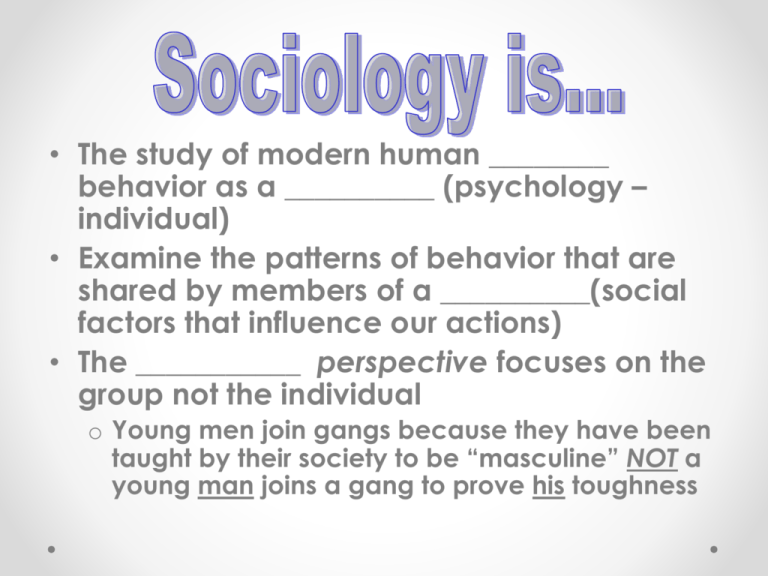Have you ever wondered why people act in certain ways, even if those ways seem irrational or illogical? Why do trends catch on like wildfire, even if they seem absurd? These questions are at the heart of behavioral sociology, a fascinating area of study that delves into the interplay between individual behavior and social forces.

Image: www.pinterest.com.mx
While we often think of ourselves as independent agents, our choices and actions are deeply influenced by the social environments we inhabit. Behavioral sociology explores this dynamic, examining how social contexts, cultural norms, and group dynamics shape our thoughts, emotions, and ultimately, our behaviors. Understanding these influences is crucial for navigating a complex world filled with social interactions, cultural differences, and ever-changing trends.
A Journey Through Time: The Roots of Behavioral Sociology
Early Influences:
The roots of behavioral sociology can be traced back to the early days of sociology itself. Thinkers like Emile Durkheim and Max Weber were deeply interested in the social forces that underpin individual behavior. Durkheim’s work on suicide examined how social structures, like religion and social integration, influence suicide rates. Weber’s studies on bureaucracy highlighted how social organizations impact individual behavior and decision-making.
The Rise of Psychology:
The development of psychology in the early 20th century also had a significant impact on behavioral sociology. Psychologists like Sigmund Freud and B.F. Skinner expanded our understanding of the individual mind, exploring the unconscious, motivation, and the power of reinforcement. This focus on individual psychology enriched the study of social behavior, creating a more nuanced view of how internal processes interact with external social influences.

Image: studylib.net
Key Concepts in Behavioral Sociology:
Social Norms and Conformity:
Society isn’t a haphazard collection of individuals. It’s a system of shared beliefs, values, and expectations known as social norms. These norms guide our behavior, often without us even realizing it. Ever felt uncomfortable wearing a mismatched outfit or speaking out against a popular opinion? These are examples of social norms at work. The need to conform and fit in, be it in dress, behavior, or opinion, is a powerful force that shapes our actions.
Social Influence and Group Dynamics:
We are constantly influenced by others. Social influence can manifest in various ways – from the subtle pressure of conformity to the overt pressure of group dynamics. Think about how a group opinion can sway your own, even if you privately disagree. This is a testament to the power of groupthink and social influence. Understanding these dynamics is crucial for understanding decision-making, especially in groups and organizations.
Social Roles and Identity:
Each of us plays different roles in life: parent, child, friend, employee, etc. These roles, shaped by social expectations, influence our behavior. We behave differently at work than we do at home, for example. Our various social roles also contribute to our sense of identity. By understanding how these roles are assigned and how they shape individual behavior, we can gain a deeper understanding of individual and collective identity formation.
Behavioral Sociology: Beyond the Classroom
The Power of Social Marketing:
Behavioral sociology’s insights are valuable in diverse fields, including marketing. Social marketing leverages social influence to promote positive behaviors and reduce harmful ones. Public health campaigns often employ this strategy. By understanding social norms and peer networks, these campaigns can effectively target messages to encourage healthy habits like vaccinations or discourage unhealthy ones like smoking.
Understanding Consumer Behavior:
Understanding consumer behavior is crucial for businesses. Behavioral sociology provides insights into how consumers make decisions, how they are influenced by advertising, and what factors drive their purchasing choices. By analyzing consumer trends and patterns, marketers can tailor their products and messaging to resonate with target audiences.
Navigating a Complex World:
The insights of behavioral sociology are essential for navigating the complexities of social life. By understanding the invisible forces that influence our behavior, we can make more informed choices, become more aware of the dynamics at play in social interactions, and build stronger relationships.
The Future of Behavioral Sociology
Behavioral sociology is a dynamic field continually evolving, incorporating new research methodologies and exploring emerging social trends. With the increasing availability of big data and the rise of social media, new insights are being uncovered regarding online behavior, the spread of information, and the formation of online communities. These advancements are offering exciting new possibilities for understanding and influencing social behavior in the digital age.
Behavioral Sociology
Conclusion
Understanding the social forces that shape our behavior is crucial for navigating the complexities of modern life. Behavioral sociology offers valuable insights into the invisible scripts that guide our actions, the dynamics that govern our interactions, and the social forces that influence our choices. By embracing the knowledge and tools provided by this field, we can become more informed and empowered individuals, better equipped to understand, navigate, and contribute to the ever-evolving tapestry of human behavior.

:max_bytes(150000):strip_icc()/OrangeGloEverydayHardwoodFloorCleaner22oz-5a95a4dd04d1cf0037cbd59c.jpeg?w=740&resize=740,414&ssl=1)




